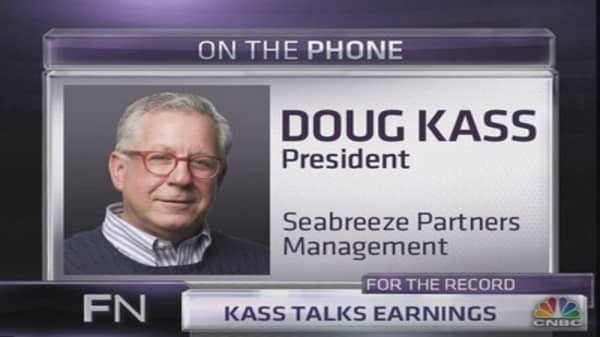Doug Kass has long been bearish on the market—and that has long been the exact wrong call. But now, Kass says the market's moment of truth is finally upon us.
"I've certainly been wrong," Kass admitted. "But being wrong doesn't keep me from warning investors."
And warn investors he did, for Kass sees this as a particularly treacherous time. "I think when the searchlights of the investor are the dimmest, when the economic and market threats are the greatest, and when market participants are the most comfortable in their inattentiveness and ignorance, the risks are surging—and that's precisely where we are now."
So what exactly is making Kass so concerned about the market right now? The president of Seabreeze Partners Management laid out his reasons on Tuesday's "Futures Now."
1. Stagnating GDP will weigh on revenue
Kass noted that "projections for second-quarter GDP—real GDP—are now under 1 percent." Indeed, Barclays cut its Q2 GDP growth forecast to 0.5 percent on Monday, and Goldman Sachs reduced its estimate from 1.3 percent to 1 percent.
Kass believes this stagnant rate of growth will be a major constraint on corporate revenue. "You've got to see a sharp acceleration in the second half for companies to have any top-line growth whatsoever," Kass said.
2. UPS lowers expectations
On Friday, UPS gave Kass one reason why this "sharp acceleration" is unlikely to come to pass. "I can't see it," Kass said, "with UPS cautioning about domestic economic growth."
UPS shares dropped by 6 percent on Friday after the company reduced earnings guidance. And one of the reasons the global shipping company gave for cutting guidance was "a slowing U.S. industrial economy." This is in line with Kass' thinking about what the rest of the year will bring.
(Read more: Cramer: Has UPS called recovery into question?)
3. Coca-Cola's weak shipments
On Tuesday, Coca-Cola gave Kass another reason to be bearish. In an earnings report that CEO Muhtar Kent said he is "not happy" with, Coca-Cola reported that soda volume in North America fell 4 percent.
That said, Kent pointed to factors that were more meteorological than economic: "We experience an extremely wet and cold second quarter," he said on Tuesday's earnings call, and "this weather clearly impacted our industry's volume growth."
(Read more: Coca-Cola's earnings meet, but CEO's 'not happy')















